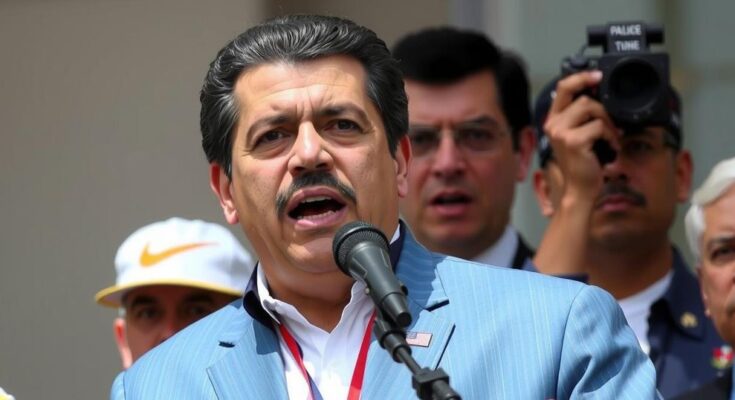Venezuelan President Nicolas Maduro is set to take oath for a third term amid protests and international condemnation of alleged electoral fraud. Opposition leader Maria Corina Machado was briefly detained, leading to increased tensions. Global leaders have reacted critically, calling for Machado’s safety and condemning Maduro’s regime. The ongoing unrest reflects a deep political crisis as Maduro clings to power despite widespread allegations of repression.
Nicolas Maduro, President of Venezuela since 2013, prepared to take his oath of office for a third term amid protests and international outcry over alleged electoral misconduct. Opposition leader Maria Corina Machado, who led a significant demonstration in Caracas, was reportedly detained by security forces after the rally, inciting condemnation from various global leaders. Despite the government’s denial of her arrest, eyewitness accounts confirmed that she was forcibly taken from her vehicle. Her detainment has been described as part of a broader pattern of repression against Maduro’s critics, further aggravating tensions as his swearing-in ceremony approached.
Following the detention of Ms. Machado, international figures, including United States President-elect Donald Trump, labeled her and the man who replaced her on the ballot, Edmundo Gonzalez Urrutia, as “freedom fighters,” demanding their safety. Countries including Ecuador and Spain have vocally condemned the Maduro administration’s actions, while Colombia has highlighted the ongoing harassment faced by Machado.
In a demonstration of resilience, Machado addressed her supporters, assuring them that “We are not afraid,” even as her allies reported increased state-sponsored violence. The United Nations raised alarms regarding arbitrary detentions and intimidation in the nation. The unrest surrounding Maduro’s rule has resulted in thousands of arrests and numerous casualties amidst ongoing civil discontent, showcasing the persistent divide in Venezuelan society regarding the government’s legitimacy and future.
Despite significant challenges, Maduro remains in power with backing from allies, including Russia and Cuba, alongside a loyal military presence within Venezuela. The conflict reflects a broader struggle for democracy in the region as Maduro’s opponents continue to call for transparency and reform, while pro-government supporters vow to uphold his leadership.
Venezuela has been experiencing a protracted political and economic crisis, exacerbated by the government led by President Nicolas Maduro, who has been in office since the death of Hugo Chavez in 2013. His re-election in 2018 was widely condemned as fraudulent, resulting in a severe economic downturn and significant social unrest. The opposition has been vocal against Maduro’s regime, with various leaders, such as Maria Corina Machado, actively protesting against alleged government repression and electoral fraud. The situation has drawn international attention, with numerous countries condemning Maduro’s actions and expressing support for democratic governance in Venezuela.
In summary, Nicolas Maduro’s upcoming oath of office is shadowed by domestic unrest and international denunciations following the detention of opposition leader Maria Corina Machado. The political landscape in Venezuela remains fraught with challenges, as the government confronts growing dissent from both national and global arenas. The call for democratic reforms continues to resonate amidst a backdrop of repression and societal division, highlighting the urgent need for resolution and accountability within Venezuelan political affairs.
Original Source: www.cbsnews.com




